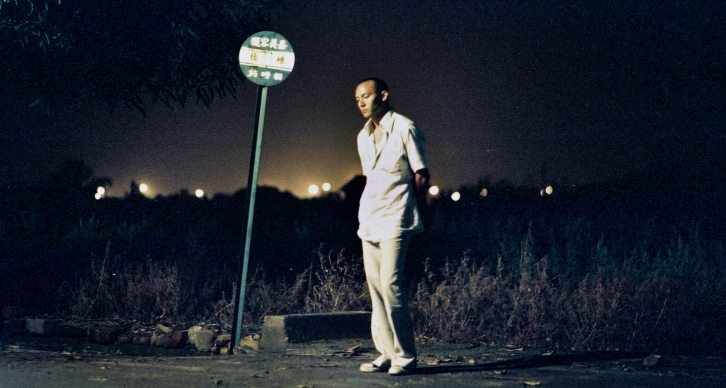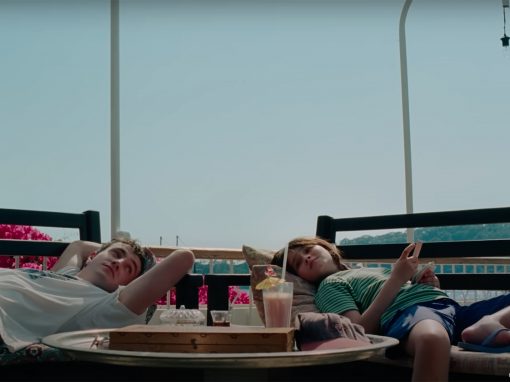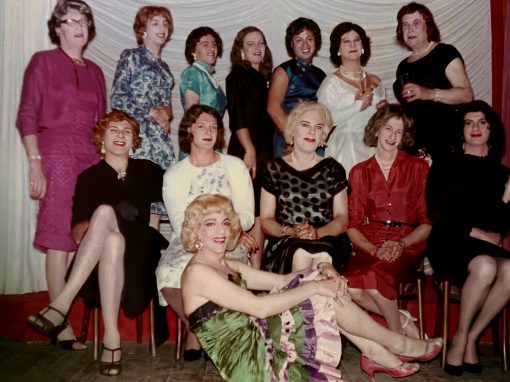Hou Hsiao-Hsien, from Taiwan, is probably my favorite living filmmaker, and so his new one, Three Times, was unsurprisingly the movie that affected me most in Toronto.
Three Times contains three stories. In the first, set in 1966, young men and women languidly while away their days in pool halls, sipping beer while pop tunes waft in the air. In the second, set in 1911, personal and political dilemmas intersect in a brothel. The final segment (and the darkest) is set in teeming present-day Taipei among young bohemians, experimenting with sex and drugs, and adrift in transitory relationships.
I’ve seen it just once, but a few things fascinate me right away about this film:
- The same actress and actor (Shu Qi and Chang Chen) play lovers in all three stories — it’s almost like they are “reincarnating” their roles over a span of a hundred years. (What a cool idea.)
- In an interview, Shu Qi even made a quick reference to the Chinese belief of reincarnation: in each successive life, we are intended to “correct” the problems and difficulties of previous lives. Only, the opposite seems to be happening in this film — our lives seem more aimless and fragmented now than they were forty years ago.
- The original Chinese title of the film is Best Of Times. Hou, like a popular musician, is drawing from his “discography” of films for these three stories. The first reminds me in look and mood of A Time To Live And A Time To Die or Dust In The Wind; the second is set in a brothel like Flowers Of Shanghai; and the third clearly recalls the modern neon-smeared interior spaces of Millennium Mambo. So, Hou has created a sort of compilation album, only he has “remade” the ideas and memories behind his previous films into new stories.
- I have previously mentioned my interest in improvisation, so it’s delightful to discover that Hou had no real script for the film, simply a few notes that were given to the actors, who weren’t told exactly where to stand, sit or move about (no blocking), and didn’t know when the camera was rolling and when it wasn’t.
- Shu Qi likened Hou to a professor. He would assign books, music and other materials for his actors to immerse in as they were developing their characters. She said (only half-jokingly) that he gave them “pop quizzes” during shooting.
- Here’s how the film opens, in utterly intoxicating fashion: men and women gracefully and wordlessly play pool, in a luxuriatingly extended scene, to the strains of “Smoke Gets In Your Eyes”. It’s one of those rare times I wished I could simply, quietly, slide out of my life and into the film, and live there forever.
- I have always believed that cinema is conceived (especially by the truly great moviemakers) to be more “subjective” (and less literalist) than we realize or give it credit for. That opening scene I mentioned? Though it features the two lead characters (obviously in love), Hou has said that the scene bears no relation to anything else that follows. It’s not a flashback or a flash-forward — and it has absolutely nothing to do with the story. It’s simply there. And somehow, that’s reason enough for me.



Anonymous
September 21, 2005 at 4:55 pm
Wow — nicely done, Girish. I particularly like the last two comments (it’s quite often how I feel when watching great films). While I haven’t seen Three Times (I hope I will, though), I like how Hou Hsiao-Hsien, as you mention, didn’t really have a script. It’s that sort of improvisation (in the right hands, of course) that can really lend magic to a film.
Anonymous
September 21, 2005 at 5:05 pm
I’m making a second a trip to NYFF on the closing weekend to catch this, so I’m glad to hear that it’s worth it. I don’t quite know how to reconcile the “new”, less overtly political Hou yet, but this one sounds almost as though it has tinges of the old Hou (in terms of repeating history) crossed with Wong.
Brian Darr
September 21, 2005 at 7:27 pm
Sounds tantalizing, girish! Cafe Lumiere has still yet to play the Bay Area for some reason, so I’m now two Hous behind. Its enough to make me think about signing up for nicheflix.
musingwoman
September 21, 2005 at 8:25 pm
Thanks for such a thoughtful review, Girish. I’d like to see Three Times one day.
I also followed the link to your earlier post about Hou Hsiao-Hsien. Some of the things you said reminded me of a favorite film, Raise the Red Lantern. So I checked IMDb and, come to find out, Hsiao-Hsien was the executive producer. 🙂
Anonymous
September 21, 2005 at 8:29 pm
hey girish, you sure you wanna live in *that* scene? I’ve seen you shoot pool.
girish
September 21, 2005 at 10:10 pm
Jeannette: I didn’t know that! It’s been years since I’ve seen Red Lantern. It’s time to revisit it.
girish
September 21, 2005 at 10:15 pm
Fats–take off your mask, you wuss.
(Is this Joey? If so, call me & we can get together for a beer. It’s been a dog’s age.)
Re: shooting pool, I remember you taught me how to, so I think that explains a lot, my man.
Tuwa
September 22, 2005 at 5:15 am
I love the way you write about film. Well, I love the way you write about your parents too.
girish
September 22, 2005 at 10:36 am
Thank you Tuwa, that’s so kind of you.
Anonymous
September 22, 2005 at 11:00 pm
Excellent review! I’m so happy this one is at the NYFF!
HarryTuttle
September 22, 2005 at 11:38 pm
Insightful leads there to decypher this puzzle, great comments Girish like for your review of Flowers of Shanghai 😉
The opening sequence was rather awkward, I was trying to spot characters, identify the time elapsed to figure the drama continuity, and it left me wondering for a while, like if I missed something, more attentive to everything because I felt I had to catch up. An interesting introduction that I hadn’t rationalized before you put it that way.
I think it’s cool to throw unrelated scenes in the middle. Seriously. Anything that shakes academism. 🙂
The color silent segment is one of the best thing I’ve seen experimented in narrative films recently!
girish
September 23, 2005 at 12:20 am
Anything that shakes academism. 🙂
Harry, I agree wholeheartedly.
Do you remember the Tony Leung scene at the closing of Wong Kar-Wai’s Days Of Being Wild when he makes his first appearance? I love how Wong climaxes his film with a complete non sequitur.
Bunuel liked to throw in such scenes with regularity too, and I’ll always love him for it.
Anonymous
September 27, 2005 at 3:16 pm
“Smoke Gets in Your Eyes”, huh? That song is *owned* by Edward Yang in The Terrorizer. Is there some way that it could be an homage? Brilliant as Hou is, Edward Yang is my favorite Taiwanese director.
girish
September 27, 2005 at 3:27 pm
I’ve never seen The Terrorizer (or, alas, any Yang but Yi Yi.)
But I’ve heard Hou plays the lead in Taipei Story, which has me very curious.